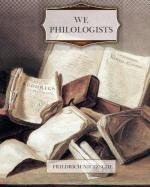With the dissolution of Christianity a great part of antiquity has become incomprehensible to us, for instance, the entire religious basis of life. On this account an imitation of antiquity is a false tendency . the betrayers or the betrayed are the philologists who still think of such a thing. We live in a period when many different conceptions of life are to be found: hence the present age is instructive to an unusual degree; and hence also the reason why it is so ill, since it suffers from the evils of all its tendencies at once. The man of the future . the European man.
164
The German Reformation widened the gap between us and antiquity: was it necessary for it to do so? It once again introduced the old contrast of “Paganism” and “Christianity”; and it was at the same time a protest against the decorative culture of the Renaissance—it was a victory gained over the same culture as had formerly been conquered by early Christianity.
In regard to “worldly things,” Christianity preserved the grosser views of the ancients. All the nobler elements in marriage, slavery, and the State are unchristian. It required the distorting characteristics of worldliness to prove itself.
165
The connection between humanism and religious rationalism was emphasised as a Saxonian trait by Kochly: the type of this philologist is Gottfried Hermann.[13]
166
I understand religions as narcotics: but when they are given to such nations as the Germans, I think they are simply rank poison.
167
All religions are, in the end, based upon certain physical assumptions, which are already in existence and adapt the religions to their needs . for example, in Christianity, the contrast between body and soul, the unlimited importance of the earth as the “world,” the marvellous occurrences in nature. If once the opposite views gain the mastery—for instance, a strict law of nature, the helplessness and superfluousness of all gods, the strict conception of the soul as a bodily process—all is over. But all Greek culture is based upon such views.
168
When we look from the character and culture of the Catholic Middle Ages back to the Greeks, we see them resplendent indeed in the rays of higher humanity; for, if we have anything to reproach these Greeks with, we must reproach the Middle Ages with it also to a much greater extent. The worship of the ancients at the time of the Renaissance was therefore quite honest and proper. We have carried matters further in one particular point, precisely in connection with that dawning ray of light. We have outstripped the Greeks in the clarifying of the world by our studies of nature and men. Our knowledge is much greater, and our judgments are more moderate and just.




